In single tweets, careers have been ended, foreign policy spats started and the news agenda upended. But as Donald Trump continues to drive missives across cyberspace from the comfort of the golf course, the clock is ticking on a social media presence he has wielded as a powerful weapon.
World leaders, business titans – and even a few Republicans – have congratulated Joe Biden on winning the 2020 presidential election, and now the ultimate sign the game's up for Trump has arrived: Facebook and Twitter have announced they will transfer their respective @POTUS handles to the Democrat on January 20.
Accounts for the White House, vice president and first lady will be transferred to the Biden team on inauguration day, with the history scrubbed clean on all and the messages from the Trump era archived.
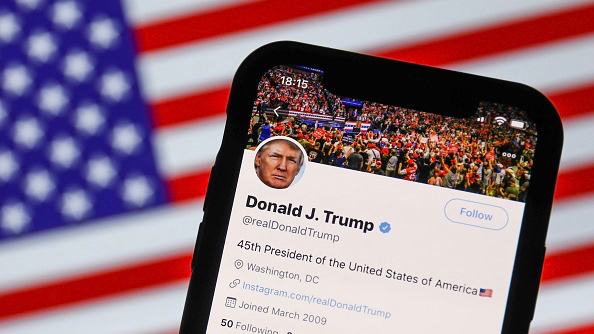
Trump will keep his personal social media accounts after January 20, but lose the privileges that come with being president. /Getty
Trump will keep his personal social media accounts after January 20, but lose the privileges that come with being president. /Getty
Three weeks on from November 3, over a fortnight after multiple news agencies called Biden the projected election winner and even as the General Services Administration (GSA) acknowledged Biden as the "apparent winner," allowing the transition to begin, the 45th president refuses to concede.
Noting the GSA decision on Tuesday without accepting defeat, he tweeted, "Our case STRONGLY continues, we will keep up the good… fight, and I believe we will prevail!"
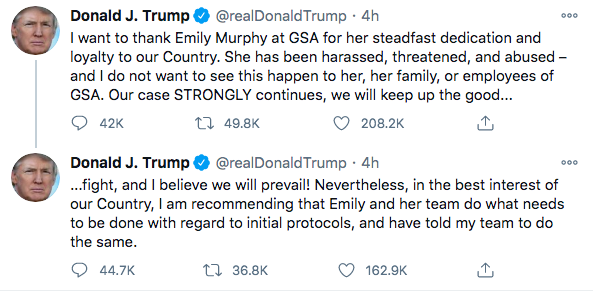
Trump responds to the GSA decision to acknowledge Biden as the "apparent winner" of the presidential election. /@realDonaldTrump
Trump responds to the GSA decision to acknowledge Biden as the "apparent winner" of the presidential election. /@realDonaldTrump
Twitter is likely to continue to be the tool of choice for the 74-year-old, who will keep his personal account, @realDonaldTrump, which has grown from three million followers in 2015 to almost 89 million today, beyond January 20.
But the ultimate online influencer will face a new reality when he becomes a former president. Not only will he no longer be shielded by the physical world protections he enjoyed while in the White House — potentially opening the door to a slew of legal problems — the rules of his virtual world will also change.
Exempt no more
The decision of social media companies to flag the tweets of a U.S. president as potentially containing false or misleading information was initially a headline news story, but has since become so commonplace that it barely causes a ripple.
According to FactBa.se, 175 of Trump’s tweets or retweets have had warning labels attached, including 15 on Sunday alone.
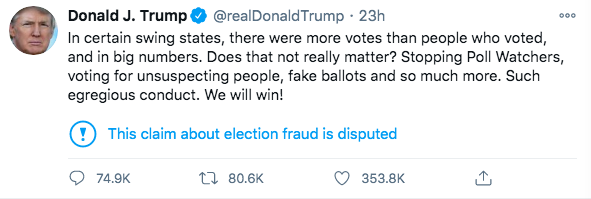
Twitter has flagged 27 of Trump's tweets or retweets since Saturday. /@realDonaldTrump
Twitter has flagged 27 of Trump's tweets or retweets since Saturday. /@realDonaldTrump
Since July 2019, Twitter has allowed content from top political figures that violates its rules to remain viewable if the company considers seeing it to be in the "public interest" – so Trump's questionable claims have been accompanied by warning labels rather than deleted, meaning they can't be shared but can be read or watched.
But as a private citizen, he will no longer be afforded the leeway given to presidents. "If an account [holder] suddenly… is not a world leader anymore, that particular policy goes away," Twitter CEO Jack Dorsey confirmed during a Senate grilling last week.
If Trump violates the platform's rules post-presidency, his tweets may be deleted by moderators and his account could be subject to a suspension or ban. The company recently banned Steve Bannon, Trump's former aide, and has previously suspended both Donald Trump Jr. and Press Secretary Kayleigh McEnany's accounts.
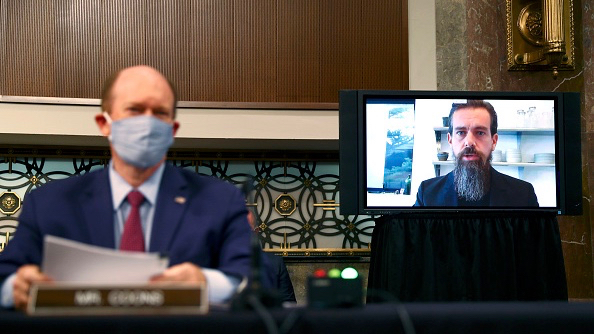
Twitter CEO Jack Dorsey testifies remotely during a Senate Judiciary Committee hearing titled "Breaking the News: Censorship, Suppression, and the 2020 Election" in Washington, D.C., November 17, 2020. Facebook CEO Mark Zuckerberg also testified remotely. /Getty
Twitter CEO Jack Dorsey testifies remotely during a Senate Judiciary Committee hearing titled "Breaking the News: Censorship, Suppression, and the 2020 Election" in Washington, D.C., November 17, 2020. Facebook CEO Mark Zuckerberg also testified remotely. /Getty
At the same congressional hearing, Facebook CEO Mark Zuckerberg said the company's general policies will not change when Trump leaves office, but acknowledged it has some "exceptions for politicians under the principle that people should be able to hear what their elected officials are saying."
"If the president or anyone else is spreading hate speech or inciting violence or posting content that delegitimizes the election," he said, "those will receive the same treatment as anyone else saying those things, and that will continue to be the case."
This is likely to mean that Trump will be subject to Facebook's third-party fact-checking system, which could in turn lead to limits on how content he creates is spread.
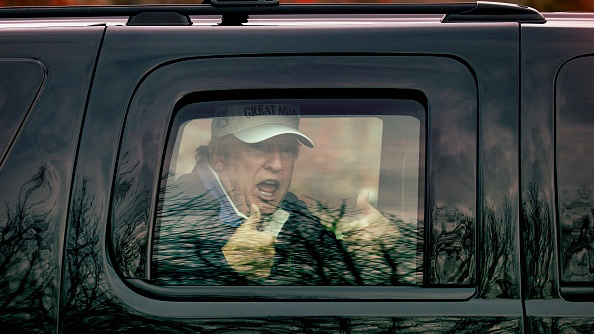
U.S. President Donald Trump gives two thumbs up to supporters from his motorcade after golfing at Trump National Golf Club in Sterling, Virginia, November 22, 2020. /Getty
U.S. President Donald Trump gives two thumbs up to supporters from his motorcade after golfing at Trump National Golf Club in Sterling, Virginia, November 22, 2020. /Getty
However, while Trump's online future will be more restricted post-presidency, it is unlikely to be significantly dimmed.
The big tech companies may not see drastic action against one of their biggest-name users as sensible, and if the Republican announces a tilt at the White House in 2024 he would likely receive new exemptions as a candidate for office.
And if worst comes to worst, the Twitter president could turn conservative favorites like Gab or Parler – which says it never decides "what content will be removed or filtered, or whose account will be removed, on the basis of the opinion expressed" – into his new megaphone, or even, as some reports suggest, set up his own digital media company.

